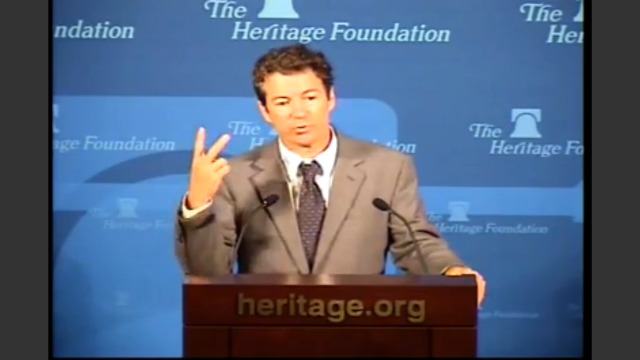
Sen. Rand Paul (R-KY), the son of libertarian Congressman and presidential candidate Ron Paul, visited the conservative Heritage Foundation on Thursday to sketch out his agenda for preserving Internet freedom. In Paul's view, this means opposing warrantless government snooping of private networks—and also opposing regulations intended to protect privacy and network neutrality.
The event follows last month's announcement of a new "Internet freedom" initiative by the Campaign for Liberty, an activist group founded by the elder Paul. It appears that father and son see eye to eye on Internet issues, and the younger Paul used the Heritage event as an opportunity to explain his views.
Sen. Paul began by referencing Gordon Crovitz's recent column in the Wall Street Journal, questioning whether the government launched the Internet. We've pointed out that Crovitz's column was factually challenged; Paul offered a more nuanced version of the argument.
"It may not be completely simple but it's definitely not as simple as that the government invented it," he said. "When you say stuff like, 'Oh, the government invented the Internet,' it sort of demeans the process of the individuals who were involved."
For example, "There was Vinton Cerf. There was Tim Berners-Lee. There were individuals. But it wasn't the faceless government that invented the Internet. It was individuals. Even if some of them did work for government, the mind of the individual is what should be extolled, not some faceless bureaucracy."
Protecting privacy
And Paul views meddling by that faceless bureaucracy as a major threat to Internet freedom. He criticized, among other things, privacy regulations that interfere with the "sanctity of contract" between users and companies like Google.
"You make a contract with Google, and Google has a right to whatever you sign away," he said. "You can give up certain things." Users can choose not to give up personal information, he noted, but then they "won't get some of the benefits of Google's search engine."
"That kind of privacy to me is a completely separate arena from the government," Paul said. "You don't have a choice to make a contractual arrangement with your government. So it's very important that we not let the government have access to our records."
Paul pointed to two specific cases in which the government has eroded privacy rights. He stated that "in the Patriot Act [presumably he means the 2008 FISA Amendments Act], they gave communications companies immunity. I'm not really for suing companies, but I'm not for telling companies they can do whatever they want to their consumers and they can run over consumers by abrogating contracts. It's a mistake to give immunity."
He argued the same point applies to the Internet security bill that went down to defeat in the Senate on Thursday. It would grant companies sweeping legal immunity for information they share with the government. "While I'm very much in favor of the freedom of the businesses involved with the Internet," Paul said, "I'm also concerned about the consumer, and the consumer's contract."
The Senator also criticized the "third party doctrine," the view that information entrusted to a third party loses the search-and-seizure protection of the Fourth Amendment. "I say that's wrong," he said. "Just because the bank holds my records, that doesn't make them any less private, and doesn't make them less mine."
Opposing the "Internet collectivist crowd"
Paul was joined by Rep. Marsha Blackburn (R-TN), a prominent opponent of network neutrality regulations who once said that they gave government the ability to "leap vampire-like upon the next great sector of American life and proceed to suck it dry in the name of 'public interest.'"
Blackburn said this week that there are "two completely different views of the Internet. It is a stark contrast. You've got the techno-left and their views. They want to make certain that government regulates. Then you have those of us that say you do not want a dysfunctional federal government, home of the dysfunctional postal service, regulating the Internet."
She warned that "Obama's bureaucrats down at the FCC," supported by "Free Press and the other Internet collectivist crowd" were busy "arguing about how their rules are going to 'protect, preserve, and sustain technologies that consumers demand.'" She conceded that this agenda "sounds so harmless," but she warned that they "want government to have the knowledge, and the power, and the control" because "they fear free individuals cannot make their own decisions."
She warned that the "bloated FCC" would "make those controls and decisions of who's going to have priority and access and assigning value to content."
Interestingly, Blackburn and Paul were on opposite sides of the Stop Online Piracy Act (SOPA) fight last year. The libertarian Paul was, like his father, an early and vocal opponent of SOPA and PIPA. In his remarks at Heritage, Paul mentioned the SOPA defeat as a model for defending Internet freedom. "I think the SOPA/PIPA victory was one of the biggest victories for the Internet grassroots that we've had," Paul said.
In contrast, conservative blogger and SOPA opponent Erick Erickson singled Blackburn out last December, proposing that conservatives should mount a primary challenge against her to punish her for supporting SOPA. But Blackburn headed off the complaints when she joined a stampede of Republicans in switching sides on the issue in the wake of January's SOPA blackout.
reader comments
289